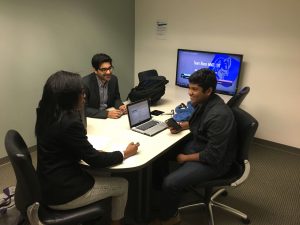Duke MMS Student Blog

Facilities at Fuqua Create a Team Spirit

A few weeks ago I was approached by a member of our alumni relations department. As a way to thank donors, she asked me to write something about the impact that Fuqua’s facilities have had on my overall experience as a student.
Of course, I gladly accepted the offer, but the more I thought about the topic, the stranger it seemed. After all, how often do we think about classrooms, team rooms, and even hallways, as significant drivers of our Fuqua experience?
Yet as I began to write down my ideas, the assignment’s purpose suddenly felt quite clear: the physical spaces we inhabit here work in tandem with students to create the culture that makes Fuqua such a special place to study business.
If one were to walk around the halls of Fuqua and ask students what separates their school from every other in the nation, they would all most likely reply with two words: Team Fuqua. The Team Fuqua spirit manifests itself among students, and can be described as a willingness to help each other succeed. It creates a common purpose and a sense of oneness that acts as a catalyst to spark innovative thinking and creative ideas among us all. This spreads through every lecture hall, team room, lunch table, and free space within the building itself.

The often overlooked part of Team Fuqua, however, may be the most obvious: physical structures and facilities at Fuqua that surround students every day of the week. By reflecting on the physical elements of Fuqua, one can understand how the building itself fosters the treasured sense of camaraderie felt by every student. This is important because it demonstrates that the building ultimately succeeds as a space that both maintains and naturally develops the Team Fuqua spirit.
As a result of the relationships built among students, faculty, and staff members, the building simultaneously acts as spaces of learning and community. Within the classrooms of Breeden Hall, Fuqua’s professors create atmospheres that breed discussion and lively debate. When class ends though, and students disperse throughout the hall of flags and the Fox Center, one will notice that those discussions do not merely end with the lecture. Instead, the energy produced within class maintains itself throughout the building.
The diversity of conversation among students, whether they be about class material, the ever-present career search, the last Fuqua Friday, or an upcoming Duke basketball game, has become a familiar characteristic of Fuqua. Yet without the facilities that promote such free interaction, like the Fox Center, where students, faculty, and staff all enjoy unstructured time together, spirited conversations amongst members of the community could never become so central to the Fuqua experience.

However, the lively social atmosphere of the school only fulfills half of the equation. The other half demands that Fuqua provides the academic environment necessary for collaborative success. And that it does. Only a short walk away from the vibrancy of the Fox Center lie the MMS team rooms. I believe I speak for all MMS students when I say that they have been vital to our academic experiences at Fuqua. Without designated areas for students to meet, discuss cases, and hear different perspectives on a problem, Fuqua would lose some of its power to cultivate its team-based learning experience.
As an MMS student, my time at Fuqua remains limited to 10 months. Yet despite the program’s short duration, it has made me appreciate the relationship between Fuqua and its community. Without the elements of the Fuqua building, Team Fuqua could never exist, and without Team Fuqua, the building itself would not be the focal point of our business school experiences.



